HowtoTakeNotes大学英语作文Howto英语作文
记笔记的方法英文作文
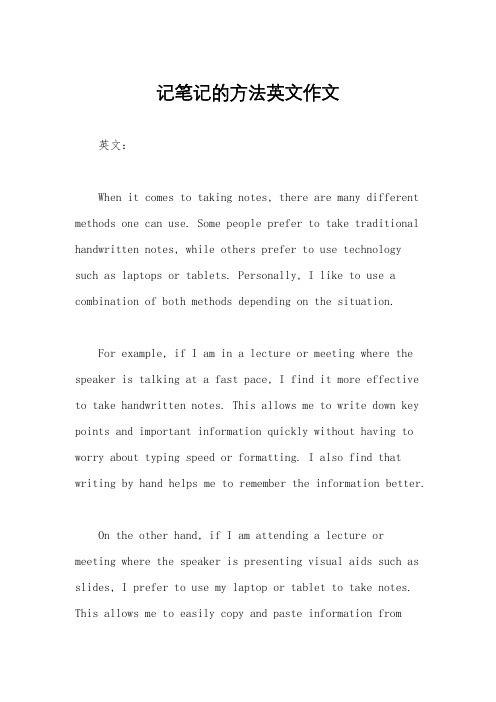
记笔记的方法英文作文英文:When it comes to taking notes, there are many different methods one can use. Some people prefer to take traditional handwritten notes, while others prefer to use technology such as laptops or tablets. Personally, I like to use a combination of both methods depending on the situation.For example, if I am in a lecture or meeting where the speaker is talking at a fast pace, I find it more effective to take handwritten notes. This allows me to write down key points and important information quickly without having to worry about typing speed or formatting. I also find that writing by hand helps me to remember the information better.On the other hand, if I am attending a lecture or meeting where the speaker is presenting visual aids such as slides, I prefer to use my laptop or tablet to take notes. This allows me to easily copy and paste information fromthe slides and organize my notes in a more structured format. It also makes it easier for me to search for specific information later on.In addition to these methods, I also like to use color-coding and symbols to help me organize my notes. For example, I might use a red pen to highlight important information, or draw a star next to a particularly significant point. This helps me to quickly identify important information when reviewing my notes later on.Overall, I believe that the most effective note-taking method is one that works best for the individual. It's important to experiment with different methods and find what works best for you.中文:说到记笔记的方法,有许多不同的方法可以使用。
做笔记最高效英语作文
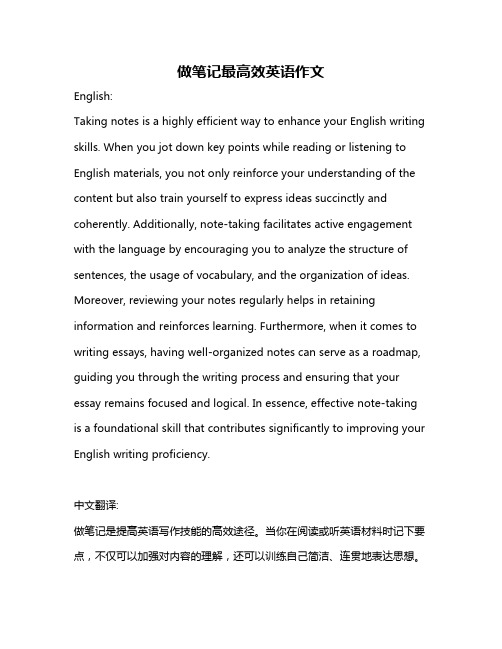
做笔记最高效英语作文English:Taking notes is a highly efficient way to enhance your English writing skills. When you jot down key points while reading or listening to English materials, you not only reinforce your understanding of the content but also train yourself to express ideas succinctly and coherently. Additionally, note-taking facilitates active engagement with the language by encouraging you to analyze the structure of sentences, the usage of vocabulary, and the organization of ideas. Moreover, reviewing your notes regularly helps in retaining information and reinforces learning. Furthermore, when it comes to writing essays, having well-organized notes can serve as a roadmap, guiding you through the writing process and ensuring that your essay remains focused and logical. In essence, effective note-taking is a foundational skill that contributes significantly to improving your English writing proficiency.中文翻译:做笔记是提高英语写作技能的高效途径。
How to take notes in English英语记笔记
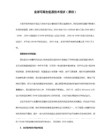
image: geekcalendar
Wil
Wil is a writer, teacher, learning technologist and keen language learner. He’s taught English in classrooms and online for nearly 10 years, trained teachers in using classroom and web technology, and written e-learning materials for several major websites.
Thereቤተ መጻሕፍቲ ባይዱare two common English expressions using the word ‘notes’. We often say ‘to make notes’ or ‘to take notes’ but what’s the difference between the two?
Make sure to look at them after the event then go through and fill in any details you were unable to write down at the time.
Experiment with these ideas and find a style of taking notes that suits you. Having a system that works is really important and a personal thing for all of us.
He speaks four languages and is currently looking for another one to start learning.
关于做笔记的看法英语作文
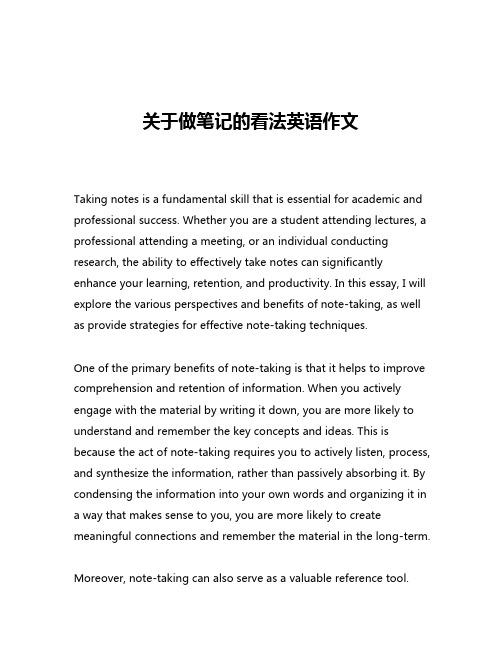
关于做笔记的看法英语作文Taking notes is a fundamental skill that is essential for academic and professional success. Whether you are a student attending lectures, a professional attending a meeting, or an individual conducting research, the ability to effectively take notes can significantly enhance your learning, retention, and productivity. In this essay, I will explore the various perspectives and benefits of note-taking, as well as provide strategies for effective note-taking techniques.One of the primary benefits of note-taking is that it helps to improve comprehension and retention of information. When you actively engage with the material by writing it down, you are more likely to understand and remember the key concepts and ideas. This is because the act of note-taking requires you to actively listen, process, and synthesize the information, rather than passively absorbing it. By condensing the information into your own words and organizing it in a way that makes sense to you, you are more likely to create meaningful connections and remember the material in the long-term.Moreover, note-taking can also serve as a valuable reference tool.When you need to revisit the information you have learned, your notes can provide a concise and organized summary of the key points, saving you time and effort. This is particularly useful in academic and professional settings where you may need to refer back to your notes for assignments, projects, or future meetings.In addition to improving comprehension and retention, note-taking can also enhance your critical thinking and problem-solving skills. As you take notes, you are required to actively engage with the material, identify the most important information, and organize it in a way that makes sense to you. This process encourages you to think critically about the information, make connections, and develop a deeper understanding of the subject matter.Furthermore, note-taking can also be a valuable tool for personal and professional development. By keeping a record of your thoughts, ideas, and insights, you can refer back to your notes to track your progress, identify areas for improvement, and develop new strategies for success. This can be particularly useful for individuals who are engaged in ongoing learning, such as students or professionals in rapidly evolving fields.However, it is important to note that not all note-taking methods are equally effective. The success of your note-taking efforts will depend on the strategies and techniques you employ. Some effective note-taking strategies include using abbreviations and shorthand, organizing your notes in a logical and structured way, and actively engaging with the material by asking questions and making connections.One popular note-taking technique is the Cornell method, which involves dividing your note-taking page into three sections: a main note-taking area, a cue column, and a summary section. This method encourages you to actively engage with the material by identifying key concepts, asking questions, and summarizing the main ideas. Another effective technique is the outlining method, which involves organizing your notes in a hierarchical structure that reflects the logical flow of the information.Regardless of the specific note-taking method you choose, it is important to remember that the most effective note-taking strategies are those that align with your personal learning style and preferences. Experiment with different techniques and find what works best for you.In conclusion, note-taking is a valuable skill that can significantly enhance your academic and professional success. By improving comprehension, retention, and critical thinking, note-taking can help you to better understand and apply the information you are learning. Furthermore, effective note-taking can also serve as a valuablereference tool and promote personal and professional development. By adopting effective note-taking strategies and techniques, you can unlock the full potential of your learning and growth.。
如何在大学里取得好成绩英语作文
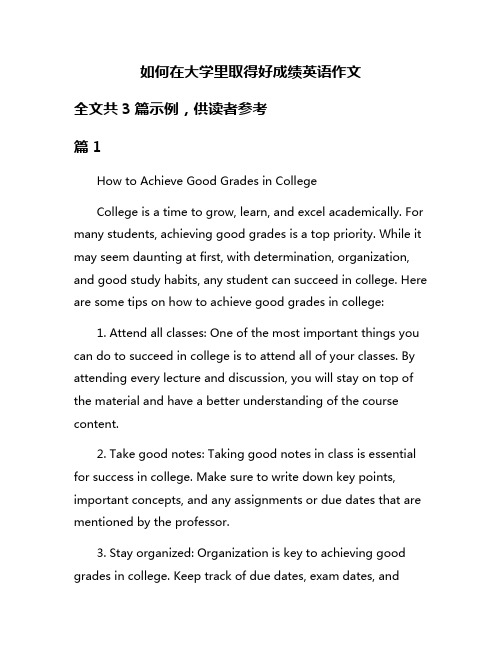
如何在大学里取得好成绩英语作文全文共3篇示例,供读者参考篇1How to Achieve Good Grades in CollegeCollege is a time to grow, learn, and excel academically. For many students, achieving good grades is a top priority. While it may seem daunting at first, with determination, organization, and good study habits, any student can succeed in college. Here are some tips on how to achieve good grades in college:1. Attend all classes: One of the most important things you can do to succeed in college is to attend all of your classes. By attending every lecture and discussion, you will stay on top of the material and have a better understanding of the course content.2. Take good notes: Taking good notes in class is essential for success in college. Make sure to write down key points, important concepts, and any assignments or due dates that are mentioned by the professor.3. Stay organized: Organization is key to achieving good grades in college. Keep track of due dates, exam dates, andassignments in a planner or on your phone. Create a study schedule and stick to it to ensure that you are staying on top of your coursework.4. Develop good study habits: Develop good study habits early on in college to set yourself up for success. Find a quiet place to study, free from distractions, and set aside time each day to review your notes, complete assignments, and prepare for exams.5. Seek help when needed: Don't be afraid to seek help from professors, tutors, or classmates when you are struggling with a concept or assignment. Asking for help shows that you are committed to succeeding in college and can help you improve your grades.6. Stay motivated: College can be challenging, but staying motivated is key to achieving good grades. Set goals for yourself, reward yourself for reaching milestones, and stay positive throughout the semester.7. Get plenty of rest: It's important to get plenty of rest in college to perform your best academically. Aim for 7-8 hours of sleep each night to ensure that you are well-rested and able to focus in class and while studying.8. Stay healthy: Taking care of your physical and mental health is essential for success in college. Make sure to eat well, exercise regularly, and practice self-care to ensure that you are feeling your best and able to perform at your highest level academically.In conclusion, achieving good grades in college requires dedication, hard work, and good study habits. By attending classes, taking good notes, staying organized, developing good study habits, seeking help when needed, staying motivated, getting plenty of rest, and staying healthy, any student can succeed academically in college. Good luck!篇2How to Achieve Good Grades in CollegeCollege is a time for growth, learning, and self-discovery. It is also a time where grades play a crucial role in shaping your future success. While achieving good grades in college may seem daunting, it is definitely achievable with the right mindset, strategies, and techniques. In this article, we will explore some tips on how to excel academically and achieve good grades in college.1. Attend classes regularlyOne of the most important factors in achieving good grades is attending classes regularly. Not only does attending classes help you stay up to date with course material, but it also demonstrates your commitment and dedication to your education. Make sure to attend all lectures, discussion sections, and tutorials, and actively participate in class discussions and activities.2. Take good notesTaking good notes is essential for academic success in college. Develop a note-taking system that works for you, whether it's using a notebook, laptop, or tablet. Make sure to focus on key concepts, ideas, and information, and organize your notes in a way that is easy to review and study. Reviewing your notes regularly can help reinforce your understanding of the material and prepare you for exams.3. Develop good study habitsDeveloping good study habits is crucial for achieving good grades in college. Set aside dedicated study time each day, create a study schedule, and stick to it. Find a quiet and comfortable study space where you can focus and concentrate, and eliminate distractions like your phone or social media. Use active study techniques such as summarizing, reviewing, andpracticing problems to deepen your understanding of the material.4. Seek help when neededDon't be afraid to seek help when needed. Whether it's from your professors, classmates, or tutors, reaching out for assistance can help clarify any confusion or misunderstanding you may have about the material. Attend office hours, join study groups, or visit academic resource centers on campus to get the support you need to succeed academically.5. Stay organizedStaying organized is key to achieving good grades in college. Keep track of assignments, deadlines, exams, and readings by using a planner or calendar. Break down tasks into smaller, manageable steps, and prioritize your workload based on importance and deadlines. Being organized can help you stay on top of your academic responsibilities and prevent last-minute stress and cramming.6. Practice self-careTaking care of yourself is essential for academic success in college. Make sure to prioritize your physical, mental, and emotional well-being by getting enough sleep, eating well,exercising regularly, and managing stress effectively. Practice self-care techniques such as mindfulness, meditation, or yoga to help you stay balanced and focused during the academic year.7. Stay motivatedStaying motivated is crucial for achieving good grades in college. Set academic goals for yourself, whether it's earning a certain GPA, making the Dean's List, or mastering a specific subject. Find your motivation by connecting your academic success to your personal values, passions, and goals. Stay positive, disciplined, and focused on your long-term objectives to overcome challenges and achieve academic success.In conclusion, achieving good grades in college requires dedication, hard work, and perseverance. By attending classes regularly, taking good notes, developing good study habits, seeking help when needed, staying organized, practicingself-care, and staying motivated, you can excel academically and achieve your academic goals. Remember that academic success is not just about grades, but also about personal growth, learning, and development. Enjoy the journey, stay committed to your education, and believe in your ability to succeed in college and beyond.篇3How to Achieve Good Grades in CollegeCollege life is much more challenging than high school, and achieving good grades requires more effort and dedication. However, with the right mindset and strategies, it is possible to excel academically in college. In this article, we will discuss some tips on how to achieve good grades in college.1. Attend classes regularlyOne of the most important factors in achieving good grades is attending classes regularly. Attending classes not only allows you to learn from the professors but also helps you stayup-to-date with the course material. It is essential to pay attention in class, take notes, and participate in discussions to maximize your learning experience.2. Manage your time effectivelyTime management is crucial in college, as you will have to juggle multiple assignments, exams, and extracurricular activities. It is essential to create a study schedule and allocate time for studying, attending classes, completing assignments, and other activities. Make sure to prioritize your tasks and avoid procrastination to stay on top of your academic work.Staying organized is key to achieving good grades in college. Keep track of assignments, exams, and deadlines by using a planner or a digital calendar. Create a study space that is free from distractions and conducive to learning. Organize your notes and study materials in a way that makes it easy for you to review and study them.4. Build good study habitsDeveloping good study habits is essential for academic success in college. Find a study routine that works best for you, whether it's studying in short intervals, using mnemonic devices, or practicing active learning. Make use of study aids such as flashcards, study groups, and online resources to enhance your learning experience.5. Ask for help when neededDon't hesitate to seek help from professors, tutors, or classmates whenever you are struggling with a particular subject or assignment. Attend office hours, tutoring sessions, or review sessions to clarify your doubts and get additional guidance. Asking for help is a sign of strength and shows your commitment to academic excellence.Staying motivated is essential for maintaining good grades in college. Set realistic goals for yourself, whether it's achieving a certain GPA or completing a specific project. Reward yourself for reaching milestones and stay positive even when faced with challenges. Surround yourself with supportive friends and family members who can encourage you to keep pushing forward.7. Take care of yourselfLastly, it is crucial to take care of yourself physically, mentally, and emotionally in order to excel academically in college. Get enough sleep, exercise regularly, eat a balanced diet, and practice self-care activities to maintain your overall well-being. Don't forget to take breaks, relax, and unwind to reduce stress and refresh your mind.In conclusion, achieving good grades in college requires a combination of hard work, dedication, and effective strategies. By attending classes regularly, managing your time effectively, staying organized, building good study habits, asking for help when needed, staying motivated, and taking care of yourself, you can excel academically and achieve your academic goals. Remember that success in college is not just about getting goodgrades but also about learning, growing, and becoming a better version of yourself. Good luck!。
背单词的最好方法英语作文
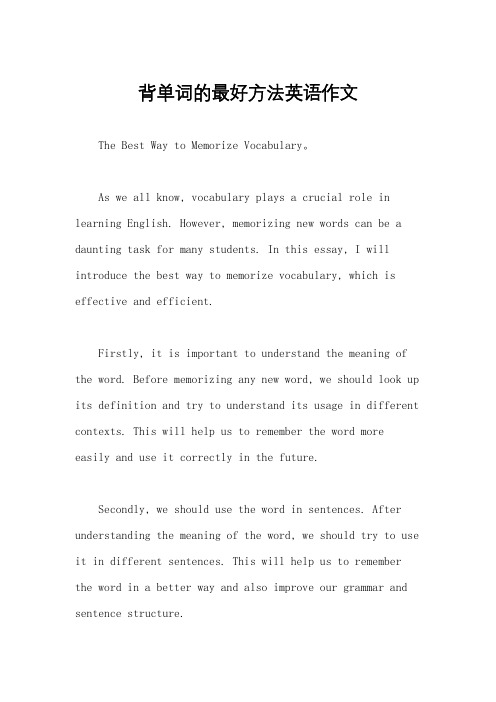
背单词的最好方法英语作文The Best Way to Memorize Vocabulary。
As we all know, vocabulary plays a crucial role in learning English. However, memorizing new words can be a daunting task for many students. In this essay, I will introduce the best way to memorize vocabulary, which is effective and efficient.Firstly, it is important to understand the meaning of the word. Before memorizing any new word, we should look up its definition and try to understand its usage in different contexts. This will help us to remember the word moreeasily and use it correctly in the future.Secondly, we should use the word in sentences. After understanding the meaning of the word, we should try to use it in different sentences. This will help us to remember the word in a better way and also improve our grammar and sentence structure.Thirdly, we should make flashcards. Flashcards are a great tool for memorizing vocabulary. We can write the word on one side of the card and its meaning on the other side. Then we can shuffle the cards and try to remember the meaning of the word when we see it.Fourthly, we can use mnemonics. Mnemonics are techniques that help us to remember information. For example, we can associate a word with a picture or a story. This will help us to remember the word more easily.Fifthly, we can practice with a partner. Practicing with a partner is a great way to memorize vocabulary. We can quiz each other on the meaning of the words and use them in different sentences. This will help us to remember the words more effectively and also improve our speaking skills.In conclusion, memorizing vocabulary is an important part of learning English. By following the above-mentioned methods, we can make the process of memorizing new wordsmore effective and efficient. With consistent practice and effort, we can improve our vocabulary and become proficient in English.。
如何做笔记作文700字
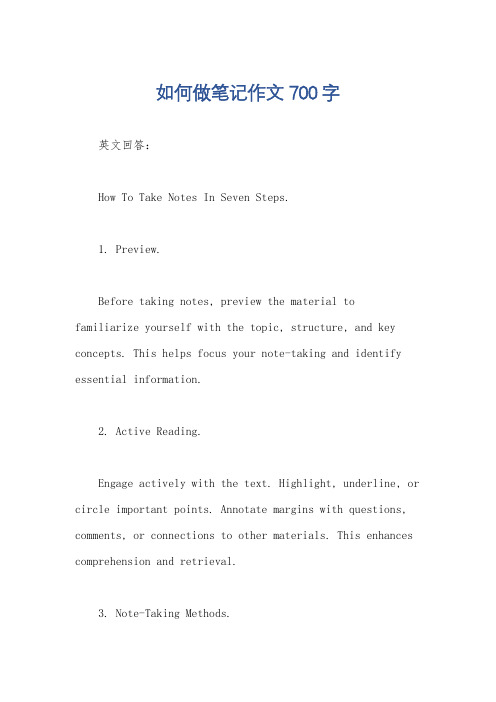
如何做笔记作文700字英文回答:How To Take Notes In Seven Steps.1. Preview.Before taking notes, preview the material tofamiliarize yourself with the topic, structure, and key concepts. This helps focus your note-taking and identify essential information.2. Active Reading.Engage actively with the text. Highlight, underline, or circle important points. Annotate margins with questions, comments, or connections to other materials. This enhances comprehension and retrieval.3. Note-Taking Methods.Choose a note-taking method that suits your learning style. Popular methods include:Cornell method: Divides the page into three sections: notes, cues, and summary.Outline method: Organizes notes hierarchically with headings and subheadings.Mapping method: Creates visual representations of concepts and their relationships.4. Condensation and Paraphrasing.Condense and paraphrase information to make it more concise and understandable. Summarize key points in your own words, capturing the essence without unnecessary details.5. Organization and Labeling.Organize notes logically, using headings, bullet points, and indentations. Label sections clearly to support easy navigation and retrieval.6. Visuals and Multimedia.Incorporate visuals, such as diagrams, charts, or images, to enhance understanding and retention. Consider using different colors, fonts, or symbols to highlight important concepts.7. Review and Reflection.Regularly review your notes to reinforce understanding and identify areas for improvement. Reflect on your note-taking process to refine your strategies and make future notes more effective.中文回答:如何做好笔记。
take notes 的好处英文作文
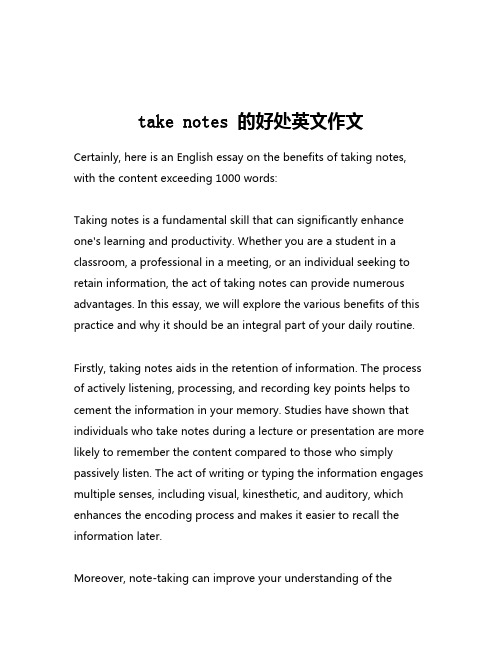
take notes 的好处英文作文Certainly, here is an English essay on the benefits of taking notes, with the content exceeding 1000 words:Taking notes is a fundamental skill that can significantly enhance one's learning and productivity. Whether you are a student in a classroom, a professional in a meeting, or an individual seeking to retain information, the act of taking notes can provide numerous advantages. In this essay, we will explore the various benefits of this practice and why it should be an integral part of your daily routine.Firstly, taking notes aids in the retention of information. The process of actively listening, processing, and recording key points helps to cement the information in your memory. Studies have shown that individuals who take notes during a lecture or presentation are more likely to remember the content compared to those who simply passively listen. The act of writing or typing the information engages multiple senses, including visual, kinesthetic, and auditory, which enhances the encoding process and makes it easier to recall the information later.Moreover, note-taking can improve your understanding of thematerial. By actively engaging with the content and identifying the most important points, you are forced to actively process the information, rather than simply letting it wash over you. This deeper level of engagement can lead to a better grasp of the subject matter, as you are required to synthesize and organize the information in a way that makes sense to you. This can be particularly beneficial in complex or technical subjects, where the act of note-taking can help you identify the key concepts and relationships between them.In addition to improving retention and understanding, taking notes can also enhance your ability to stay focused and engaged during a lecture, meeting, or learning session. The act of writing or typing requires a certain level of concentration, which can help to prevent your mind from wandering or becoming distracted. By actively participating in the process, you are more likely to remain attentive and avoid the temptation to multitask or engage in other activities that could hinder your learning.Furthermore, note-taking can serve as a valuable reference tool for future use. Whether you are a student preparing for an exam, a professional reviewing past discussions, or an individual seeking to recall important information, your notes can provide a valuable resource. By organizing your notes in a clear and structured manner, you can easily refer back to them when needed, saving time and effort in the long run.Another significant benefit of note-taking is its ability to enhance your critical thinking and problem-solving skills. As you actively engage with the material, you are required to identify the most important information, synthesize it, and organize it in a way that makes sense to you. This process encourages you to think critically about the content, analyze it, and draw your own conclusions. This can be particularly beneficial in fields such as business, science, or engineering, where the ability to think critically and solve complex problems is essential.Moreover, the act of note-taking can also improve your writing skills. By regularly practicing the skill of concisely and effectively capturing key points, you can develop a better understanding of how to communicate information in a clear and organized manner. This can be beneficial not only in academic or professional settings but also in your personal life, as effective communication is a valuable skill in all aspects of life.Finally, taking notes can also have a positive impact on your overall productivity and time management. By having a record of important information, you can easily refer back to it, reducing the need to search for or re-gather information. This can save you valuable time and energy, allowing you to focus on other tasks and responsibilities.In conclusion, the benefits of taking notes are numerous and far-reaching. From improved retention and understanding to enhanced critical thinking and productivity, the act of note-taking can be a powerful tool in your personal and professional development. Whether you are a student, a professional, or an individual seeking to learn and grow, incorporating the practice of note-taking into your daily routine can be a game-changer in your journey towards success.。
- 1、下载文档前请自行甄别文档内容的完整性,平台不提供额外的编辑、内容补充、找答案等附加服务。
- 2、"仅部分预览"的文档,不可在线预览部分如存在完整性等问题,可反馈申请退款(可完整预览的文档不适用该条件!)。
- 3、如文档侵犯您的权益,请联系客服反馈,我们会尽快为您处理(人工客服工作时间:9:00-18:30)。
HowtoTakeNotes大学英语作文Howto英
语作文
There are many things you should do if you want to excel in college courses.One
of the most important things, Ithink, is to take effective notes.The
following tips should help you take better notes in your classes.有许多事情你应该做的,如果你想在大学课程。
我想,最重要的事情之一是采取有效的笔记。
下面的建议将帮助你在你的课程笔记做得更好。
First, attend classes faithfully.Copying
another student's notes cannot substitute for hearing the idea in person.Second,
develop a system of ing
abbreviations for often used words and special terms can speed up your note taking.In
addition, be alert for signals of importance: anything written on blackboard, definitions, exles, emphasized words, and repeated ideas.Writing
down exles and connections between ideas is also essential.Too
many students merely copy the terms the teacher puts on the blackboard; they forget that as time goes by, details that serve as a bridge between the ideas quickly fade.Next,
review your notes after class toclassify and expand them.Finally,
take notes in every class you attend.Otherwise,
you are sure to forget most of what you hear.首先,上课认真。
抄袭其他同学的笔记不能代替听到这个想法。
第二,开发一个系统的缩写。
使用缩写常用单词和特别条款可以加快你的笔记。
此外,信号保持警惕的重要性:写在黑板上的任何东西,定义,实例,强调单词和重复的想法。
写例子和思想之间的联系也是必不可少的。
太多的学生仅仅是老师在黑板上把条款复印;他们忘记,随着时间的流逝,细节之间充当桥梁的想法很快消退。
接下来,复习你的笔记课后toclassify和扩大。
最后,做笔记在每一节课你参加。
否则,你肯定会忘记大部分你所听到的。
If you can follow the above tips, you are bound to find all your lessons easy and enjoyable.And, as time goes, you will do better than most of the students in your class.
如果你能遵循以上建议,你一定会找到所有功课轻松和愉快的。
随着时间的推移,你会做得更好比大多数的学生在你的课。
